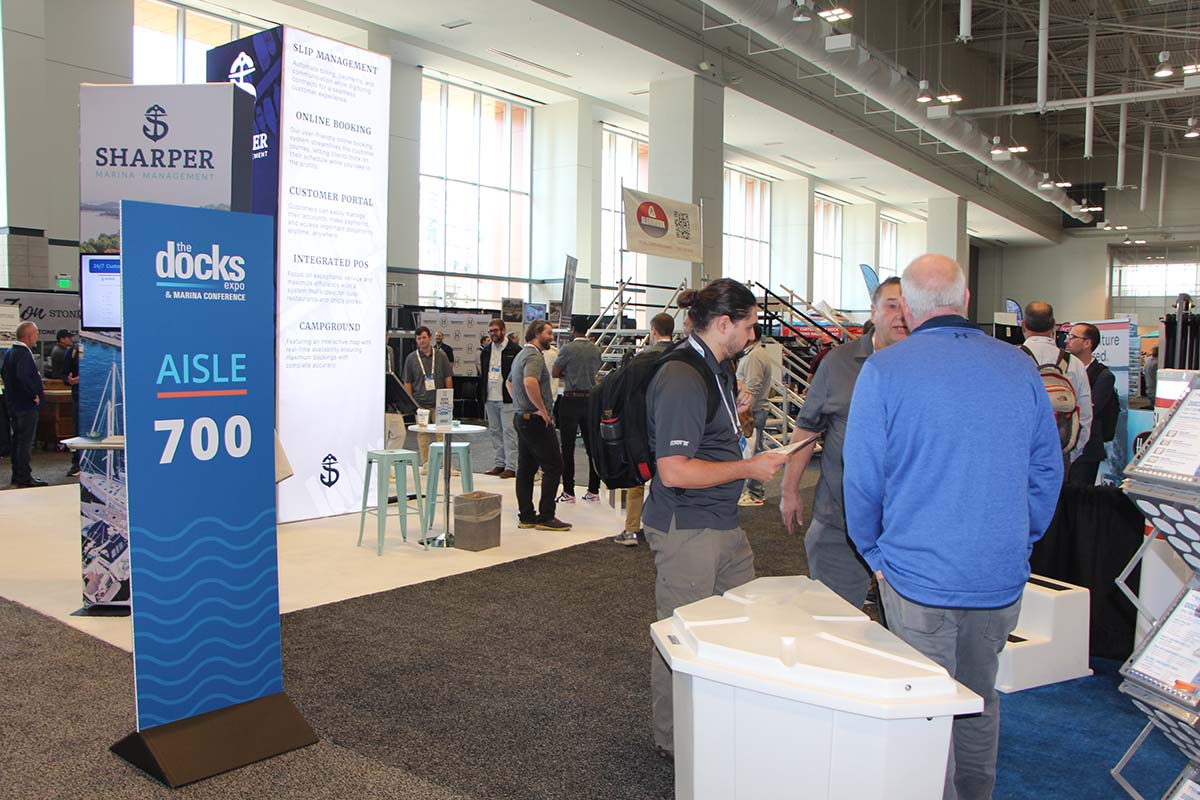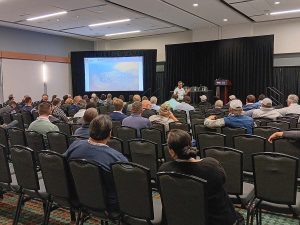
Tax Deductions for Attending Trade Shows and Other Events
Published on October 24, 2025Industry events such as The Docks Expo and Marina Conference are a good way to gain know-how, find new suppliers, capture marketplace intelligence and network with other industry professionals. Best of all, Uncle Sam, in the form of our tax laws, is willing to pick up a portion of the expense of attending, at least for some.
Every marina and boatyard, its owners, managers and employees (even a shareholder/employee), can legitimately claim an income tax deduction for the expenses of attending business-related events. Knowing what costs can and cannot be written off, and by whom, is a key to an affordable experience.
Deductions Aplenty
Thanks to U.S. tax laws, the government will pick up the tab for a sizable portion of the expenses of attending events if it’s “business-related,” and the rules are followed. When it comes to events for investment, political, social or other purposes unrelated to business, only a limited expense deduction may be available.
When attending a business-related show, convention, meeting or seminar, three types of costs are tax deductible:
- The cost of the event
- The cost of getting to and from the event
- The cost of necessary expenses while away from home
However, those rules also contain quite a few gray areas. If the business foots the bill for taking employees to an event, the full amount of their meals is deductible by the marina/boatyard. The 50% rule applies only to the business owner.
If a meal immediately precedes or follows a substantial business meeting, 50% of the cost associated with entertainment can be deducted, if the entertainment was not “lavish or extravagant.”
If a supplier provides meals in a hospitality suite at a convention with the clear intent of generating business, the cost is deductible. Other meals, that were purely for goodwill purposes, don’t qualify as directly related to either the supplier or marina/boatyard business. Under the Tax Cuts and Jobs Act (TCJA), meals during business travel and meals at a seminar or conference are 50% deductible.
Travel to a Tax Deduction
Generally, a boatyard/marina business or self-employed professional can deduct “ordinary and necessary” expenses incurred with business-related travel. Meeting the requirement of being “ordinary and necessary” business expenses, and if the trip is completely business-related, the full amount is deductible for expenses including:

- Travel by plane, car, bus or train between the attendee’s home and the destination
- Transportation at the destination, including from the airport to the hotel, the hotel to the event and even the cost of a car rental
- Actual or standard mileage costs of using a personal or business vehicle for the trip
- Parking, tolls and other costs associated with the use of the vehicle
- Lodging
- Meals, either the actual cost or the IRS’s per diem allowance
- Dry cleaning or laundry services
- Tips related to any of the above
A Rough Landing
Today, and at least until 2026, the employee business expenses cannot be taken as a personal itemized deduction. The marina or boatyard, along with self-employed professionals and independent contractors, can continue reaping tax savings when attending events.
Expenses, including travel, lodging and meals, can be deducted by the marina or boatyard business for owners and employees attending a convention or trade show within the United States, so long as it can be shown that attendance benefited the business. This applies to workshops, conferences and seminars as well as actual trade shows and conventions.
However, while travel expenses are among the most common business expense deductions, this type of expense can also be one of the most confusing. Fortunately, things can go a lot smoother when using the IRS’s standard expense deduction.
Per Diem
Business travel in general entails a wide variety of expenses. In addition to the cost of getting to and from the event destination, paying for a place to stay, local transportation, meals and entertainment and even “remote” attendance, tax deductions are possible. The IRS’s per diem rules greatly simplify the process of substantiating business travel expense amounts.
Originally designed for federal employees, the per diem is a daily allowance for specific travel expenses used by private employers and accepted by the IRS. While the per diem amount does not cover the transportation to out-of-town events or other business destinations, it does cover lodging, along with meals and incidentals once an attendee arrives at the event.
Updated every year, the per diem rates change as costs rise. The per diem rates include three components:
- Meals and incidental expenses (M&IE) “high/low” rates are $319 for travel to any high-cost locality and $225 for travel to any other locality in the continental United States. The amount of the high rate treated as paid for meals is $86 or $74 in any other locality.
- Incidental expenses covering only things such as fees, tips and the like remain at $5 per day.
- High-cost cities and locations cover the cost when business requires visiting a more expensive destination.
Friends and Family
Generally, there is no tax deduction for a spouse, dependent or any other individual traveling with an attendee. For their travel expenses to be deductible, the spouse or other individual must also be an employee of the business. A spouse’s travel must be for a bona fide business purpose.
Although not deductible, those accompanying spouses, family members or friends can share accommodations that are priced “per room” without jeopardizing the attendee’s deduction. When driving, rarely does an extra passenger add to the expense.
Business Trip Versus Vacation
When it comes to travel that is both business-related and personal, the IRS is on the lookout for anyone trying to classify a nondeductible personal trip as a deductible business trip. Fortunately, convention-related expense deductions have long been possible even if part of the trip included personal vacation time.
Traveling to a destination and engaging in both personal and business activities means deducting traveling expenses to and from the destination only if the trip is primarily related to the marina or boatyard business.
If the trip is primarily personal in nature, none of the traveling expenses are deductible. This is true even if some business activities are engaged in while at the destination. Naturally, deductions are permitted for expenses incurred while at the destination if they otherwise qualify as business deductions.
Reimbursing Attendees
To reimburse workers for expenses incurred attending shows, conventions and other events, a marina/boatyard can establish an IRS-approved reimbursement program. These so-called “accountable plans” cover the expense of attending or participating in remote events as long as they are business-related.
Employees provide receipts for their expenditures, and the marina or boatyard pays them back. The boatyard/marina then deducts the reimbursement as a business expense. These reimbursements must be reasonable and necessary.
Those deductions might even include a portion of the unique expenses associated with attending or participating in remote meetings, seminars or other remote events such as:
- Cell phone or landline plan
- Personal computer or tablet
- Home internet plan
- Teleconferencing software or hardware
Obviously, only briefly attending a remote show, webinar or other event would make allocating costs extremely difficult for anyone not already working remotely. For those individuals, deducting “education-related” expenses might be the preferred course of action.
The requirements for education-related expenses are that the event, webinar or seminar must improve a participant’s skills or help maintain their professional expertise. Plus, they must be related to the individual’s field of work.
The IRS Likes Records
Physically attending a show or other industry event can mean big bills for travel and hotels. A marina or boatyard business can deduct those expenses, softening the blow to the bottom line. However, deductions must be supported by adequate documentation.
There is no difference whether an incorporated marina or boatyard or a sole proprietorship pays convention expenses directly. However, a business has the added burden of getting supporting documentation from its owner or employee, reimbursing the employee and ensuring everything is entered on the operation’s books.
While a boatyard or marina is not required to keep receipts for expenditures under $75, it doesn’t hurt to do so. Receipts often serve as a reminder of a deductible expense, especially where the payment was in cash.
Benefits and Benefitting
While unreimbursed employee business expenses are no longer deductible, at least until 2026, a marina/boatyard business, its owner and self-employed professionals can deduct expenses incurred attending trade shows, convenions and other business-related events. The deductions can include registration fees, travel costs , lodging as well as 50% of the cost of business-related meals.
Naturally, deducting show attendance costs that are lavish or extravagant is a no-no. Showing the business purpose of these or any other expense is needed to secure the deduction. The complexity and ever-changing rules make professional guidance necessary for those wishing to secure the maximum write-off for their boatyard or marina business.
| Categories | |
| Tags |





